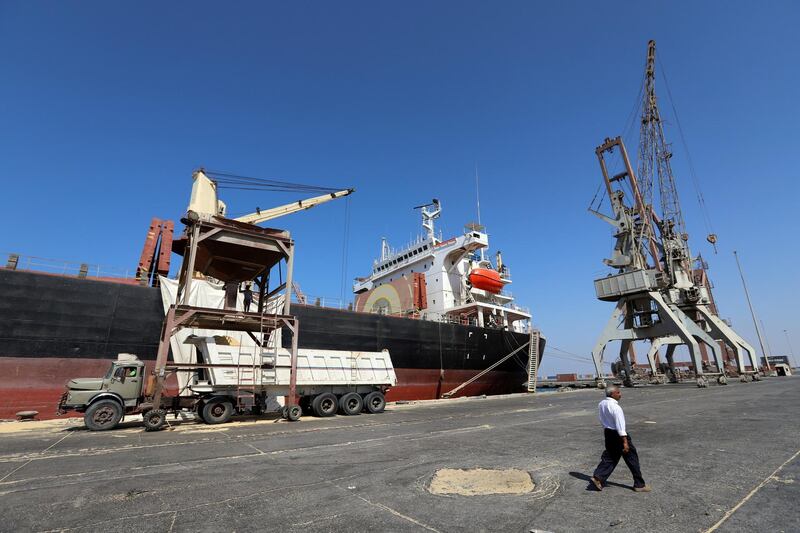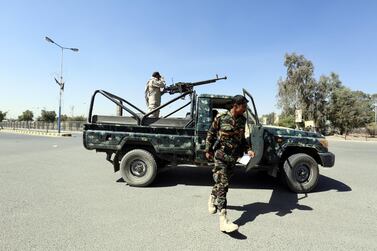The Saudi-led Arab Coalition in Yemen has notified the UN Security Council of its concerns regarding "persistent and deliberate" violations of the Hodeidah ceasefire by Houthi rebels.
The ceasefire deal, one of several confidence-building measures agreed between the government and the Iran-backed rebels at talks in Sweden, is seen as the best hope for launching full-scale peace negotiations to end four years of devastating war in Yemen.
The coalition's concerns about the rebel violations and their impact on the implementation of the Stockholm Agreement were conveyed in a letter delivered to UN Secretary General Antonio Guterres in New York on Thursday, state news agency Wam reported.
Commenting on his meeting with Mr Guterres, Dr Anwar Gargash, UAE Minister of State for Foreign Affairs, said important discussions were held on the prospects for peace, and that the truce deal was at a "critical juncture".
Important discussion today with @AntonioGuterres about prospect for peace in Yemen & leading role of @OSE_Yemen in brokering Stockholm Agreement. Deal at critical juncture due to ongoing violations by the Houthis that threaten the overall political process. pic.twitter.com/bYbdKnyg3T
— د. أنور قرقاش (@AnwarGargash) January 31, 2019
"We have a distinct opportunity to address the Yemen crisis," Dr Gargash said on Twitter.
"The UN role is critical," he continued, adding that the Arab Coalition members will continue to support the UN and its work.
"We must make Stockholm work," Dr Gargash said.
We have a distinct opportunity to address the Yemen crisis. The UN role is critical, and we assured @atonioguterres of our support for the UN and its work. We must make Stockholm work.
— د. أنور قرقاش (@AnwarGargash) January 31, 2019
The UN special envoy to Yemen, Martin Griffiths, also expressed concern about the fate of the truce on Thursday and called for restraint all sides.
Deeply concerned about recent hostilities in #Yemen, the SE calls on all parties to exercise utmost restraint and de-escalate tensions. What we need now is speedy redeployments according to an RCC plan. #Hudayda #Yemen
— @OSE_Yemen (@OSE_Yemen) January 31, 2019
The coalition, in which the UAE plays a leading role, says the rebels committed 1,038 violations of the truce deal and reinforced their military positions among civilian populations. Attacks targeting civilian populated areas have killed 74 people and wounded 563 others,.
The Houthis have also failed to withdraw from Hodeidah's ports as agreed in Stockholm.
"All these actions are direct violations of several provisions of the Stockholm Agreement and Resolution 2451 (2018)," the coalition said.
The coalition said one of the most blatant violations was the targeting of the Redeployment Co-ordination Committee (RCC) on January 17, in an attempt to intimidate its members. The RCC plays a central role in implementing the Stockholm Agreement.
The coalition also noted that the Iran-backed Houthis continued to block humanitarian aid deliveries, despite vessels being cleared by the UN Verification and Inspection Mechanism in Hodeidah and Al Saleef ports, Wam reported.
Mortar shelling from Houthi controlled territory on January 24 started a fire at a grain silo at the Red Sea Mills near Hodeidah, destroying thousands of tonnes of grain provided by UN agencies.
The coalition said the attack showed "callous disregard" for the well-being of Yemenis.
The Hodeidah truce Stockholm is a key element of the Stockholm agreement, which includes a prisoner swap, the creation of a demilitarised zone around Yemen’s vital Red Sea trade corridor through a series of withdrawals by Houthi militias, and the formation of a committee to discuss the future of Taez.






